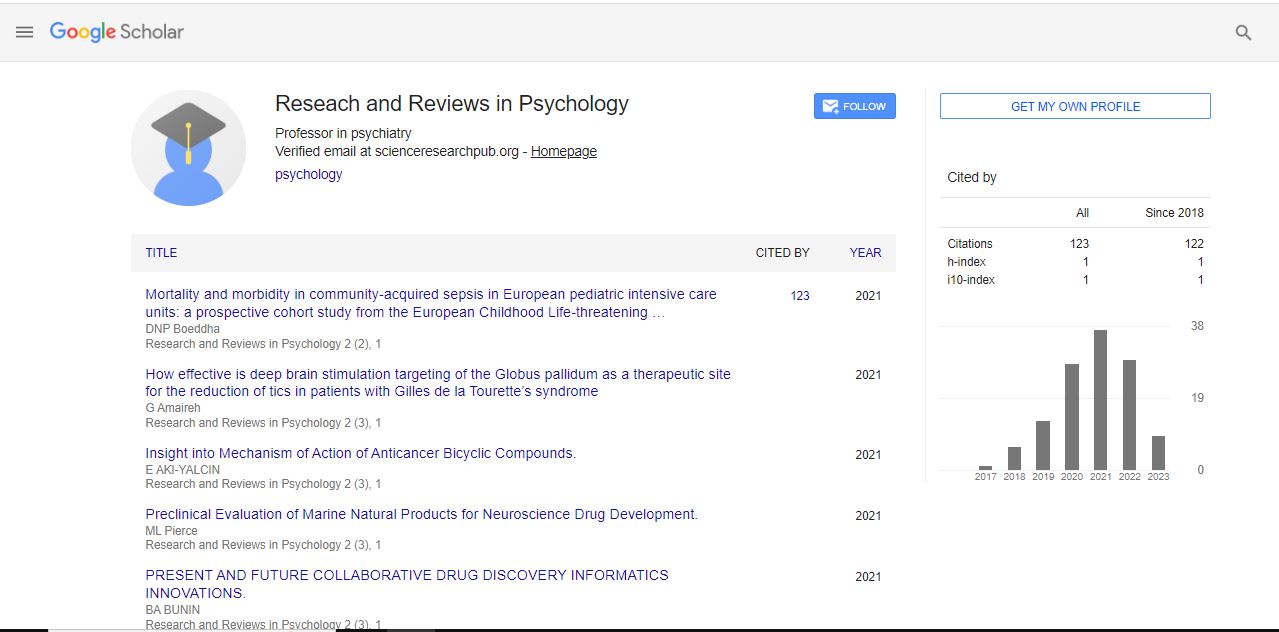Opinion Article, Research And Reviews In Psychology Vol: 3 Issue: 1
Mental Illness Etiology
Petrogalli Nicola*
Department of Health Sciences, University of Brasilia (UnB), Campus Darcy Ribeiro, Asa Norte, Brasilia, Brazil.
*Corresponding Author: Petrogalli Nicola
Department of Health Sciences, University of Brasilia (UnB), Campus Darcy Ribeiro, Asa Norte, Brasilia, Brazil.
Email: n.petrogalli@studenti.unb.it
Received date: 01 February, 2022, Manuscript No. RRPY-22-22392;
Editor assigned date: 07 February, 2022; Pre QC No. RRPY-22-22392 (PQ);
Reviewed date: 14 February, 2022, QC No. RRPY-22-22392;
Revised date: 24 February, 2022, Manuscript No: RRPY-22-22392 (R);
Published date: 01 March, 2022, DOI:10.4172/rrpy.1000317.
Keywords: Etiology
Introduction
The main objective of this study is to have deep insight about the manifestation of hysterical symptoms and how it affects personal, social and marital life of males diagnosed with Functional Neurological disorder. It was achieved by using grounded theory approach. Through Purposive sampling, six men (N=6) (under diagnostic label of Functional neurological disorder) were selected based on inclusion and exclusion criteria from the department of Adult Psychiatry, Mayo Hospital, Lahore and the department of Adult Psychiatry, Sir Ganga Ram Hospital, Lahore. Interview guide was formed to have insight about hysterical symptoms exhibited by males via semi structured interview protocol. Six categories were developed including bodily symptoms, paradox of control, mind-body conflict, disconnection from self and world, engaging in a battle and sexual incompetency. Briefly, the theory that emerged posits that people with FND not only show physical or bodily symptoms but there are other aspects which are equally important and must be addressed. People with FND feel both in control and not in control of their mind, body and social. They also reported mind-body conflict and how they find themselves in dilemma in understanding them and their surrounding resulting in developing a sense of disconnection. Contrary to it, they are struggling to maintain their true identities intact. They are involved in a continuous battle in a way that their mind, bodies and other people are related. Interestingly, it has been observed that all the participants have pent-up frustration due to their body symptomatology but people who are married tend to have more sexual frustration. They find themselves drained with their bodily symptoms and its reactions. So it can clearly be seen that hysterical symptom have great impact on people’s (diagnosed with Functional Neurological disorder) personal, social and marital life.
Generalized Myofascial Syndrome
Laryngospasm is a phenomenon consisting in spasms of the Larynx Constrictor Muscle which may be triggered by the spatial position of the Hyoid Bone and the muscular fascicles keeping this special bone in place - the Hyoid Bone is, indeed, the only one in the human body that does not have contact with other ones. One of the distinctive features of laryngospasm is the feeling of being about to die, common in panic attacks as well. Since one of the most common symptoms referred by patients after these acute episodes is the sensation to choke and the fear to die that follows, laryngospasm is very likely to be related to panic attacks.
The prevalence of constipation in patients with Parkinson's disease is around 75%. Constipation is often the first sign of motor symptoms. Patients with these symptoms can experience complications in the form of megacolon, pseudo-obstruction, volvulus, abdominal perforation, and distress. This causes severe constipation not to be tolerated. Constipation is a symptom of disotonomy and is mainly caused by a decrease in colonic motility and ano-rectal dysfunction. Degeneration of peripheral autonomic nuclei and brain stem causes constipation. Parasympathetic cholinergic denervation can cause sphincter dissinergia i.e., damage to the relaxation coordination of the anal sphincter which subsequently results in the inability to defecate normally.
This symptom is experienced by about half of all patients with Parkinson's disease. Sexual dysfunction in Parkinson's disease includes erectile dysfunction, difficulty achieving orgasm, decreased libido, and decreased genital sensitivity. Hypersexuality or increased sexual stimulation can sometimes occur which is usually associated with treatment with a dopamine agonist. Erectile dysfunction results from autonomic degeneration with parasympathetic and sympathetic denominations. Sexual dysfunction can also occur due to motor dysfunction, drugs, or mood disorders. Testosterone deficiency is involved in some cases. This symptom is experienced by about half of all patients with Parkinson's disease. Sexual dysfunction in Parkinson's disease includes erectile dysfunction, difficulty achieving orgasm, decreased libido, and decreased genital sensitivity. Hypersexuality or increased sexual stimulation can sometimes occur which is usually associated with treatment with a dopamine agonist.
Erectile dysfunction results from autonomic degeneration with parasympathetic and sympathetic denominations. Sexual dysfunction can also occur due to motor dysfunction, drugs, or mood disorders. Testosterone deficiency is involved in some cases.
 Spanish
Spanish  Chinese
Chinese  Russian
Russian  German
German  French
French  Japanese
Japanese  Portuguese
Portuguese  Hindi
Hindi 